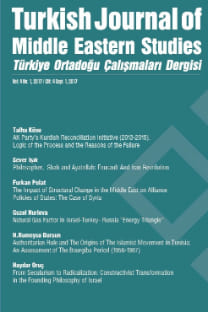Beluci Sünnilerin İran İslam Cumhuriyeti’nin Etno-Dini Politikasına karşı Tepkilerinin İncelenmesi
Bu çalışma, Beluci-Sünni etnik azınlığının İran İslam Cumhuriyeti'nin asimilasyon temelli yaklaşımına karşı tepkisini incelemektedir. Bu çalışmada İran teokratik siyasal sisteminin asimilasyon temelli bir yaklaşım benimsediği ve Beluci-Sunnilerini egemen etnik-dini grup olan Şii Farslar içinde asimile etmeye çalıştığı, ancak bu politikanın toplumun farklı kesimleri tarafından direnişle karşılandığı iddia edilmektedir. Sonuç olarak bu araştırma Beluci Sunniler arasında etno-dini değerlerini korumak için genel bir fikir birliğinin olmasına rağmen, Beluci-Sunni toplumunun her bir kesiminin kendine uygun olan ve kültürel çabalardan politik ve askeri faaliyetlere kadar uzanan yöntemlerle merkezi hükümetin etno-dini politikasına karşı mücadele ettiğni tespit etmektedir.
Anahtar Kelimeler:
Beluci Sünniler, Etno-Dini Asimilasyon, İran İslam Cumhuriyeti, Şii
Examining the Response of Baloch Sunnis to the Ethno-Religious Policy of the Islamic Republic of Iran
This study investigates the response of the Baloch Sunni ethno-religious minorty towards the assimilationist approach of the Islamic Republic of Iran. It argues that the Iranian theocratic political system uses an assimilationist approach and tries to assimilate the Baloch-Sunni into Shia Persain dominated ethno-religious group; but, this policy has been resisted by different strata of the society. The study finds that although there is a general consensus among the Baloch Sunnis to uphold their ethno-religious values, each segment of the Baloch Sunni society is combatting the central government’s ethno-religious policy on its own way depending on the means available, ranging from cultural efforts to political and military activities.
___
- The Ninth Majlis elections in Iran: Electoral laws, Procedures and Institutions, Intellectual Discourse, (Scopus indexed), vol. 21 no. 1, 2013
- Religion and Politics: An Analytical Inquiry of Contemporary Reform Movements in Iran (co-author), Tafhim: IKIM Journal of Islam and the Contemporary World, vol. 7, 2014
- The 11th Presidential Election in Iran, Akademika, Vol. 84 (3) 2014, Universiti Kebangsaan Malaysia.
- Shi’ism in the Islamic Republic of Iran; Its Muslim World Policy (co-author). Al-Shajarah, (ISI indexed), vol. 20, no. 1, 2015, Institute of Islamic Thought and Civilization,
- The Iranian Diaspora in Malaysia: A Socio-Economic and Political Analysis, Diaspora Studies, (Scopus Indexed), Issue 10, no. 1, 2016 Taylor & Francis
- Understanding Ethno-Religious Dynamics in the Islamic Republic of Iran. Analysis No. 1, November 2016. Center for Iranian Studies in Ankara, Turkey
- Tenth Majlis Election in Iran; 10th Majlis Election in Iran: Structural, Institutional, Legal, and Political Issues, Electronic Journal of Political Science Studies, Turkey, vol.8, no.1, 2017
- The Islamic Republic of Iran’s Networking Diplomacy in the Muslim World: The Case of Ahl-ul Bayt World Assembly activities in Malaysia and Afghanistan. Intellectual Discourse, vol. 25, Special Issue, 2017. (Scopus Indexed),
- The Iran’s Educational Diplomacy in the Muslim World: Activities of Al-Mustafa International University in Malaysia and Afghanistan, Insight Turkey, (Scopus Indexed), vol. 20, no. 1, 2017, Ankara, Turkey
- Evaluating the Islamic Republic of Iran’s Public Diplomacy. International Journal of Political Studies, vol. 4, no, 2, 2018, Sakarya University, Turkey
- Iran’s Aid Diplomacy in Afghanistan: The Role of Imam Khomeini Relief Committee, Contemporary review of the Middle East. Vo. 5, no. 4, 2018, (Sage Pub.), Jawaharlal Nehru University, India
- ISSN: 2147-7523
- Başlangıç: 2014
- Yayıncı: Sakarya Üniversitesi Ortadoğu Enstitüsü adına Ali Balcı
Sayıdaki Diğer Makaleler
The One-State Condition: Occupation and Democracy in Israel / Palestine
Musul Rehineler Krizinde Türkiye’nin Kriz Yönetimi
İnsani Diplomasi, Teoriden Pratiğe: Türk Dış Politikasının Yeni Aracı
The One State Condition: Occupation and Democracy in Israel / Palestine.
Iraklılık Kimliği: Irak'ta Kimliğin Alternatif Tarihi
Filistin’in Sosyo-Ekonomik Sıkıntılarının Giderilmesinde Türkiye’nin İmkân ve Sınırları
Suudi Arabistan Dış Politikasında Muhammed Bin Selman’ın “Bumerang” Etkisi
Bir Miti Çözmek: Sosyal Medyada Kadın Kürt Savaşçılar Mitinin Doğuşu
